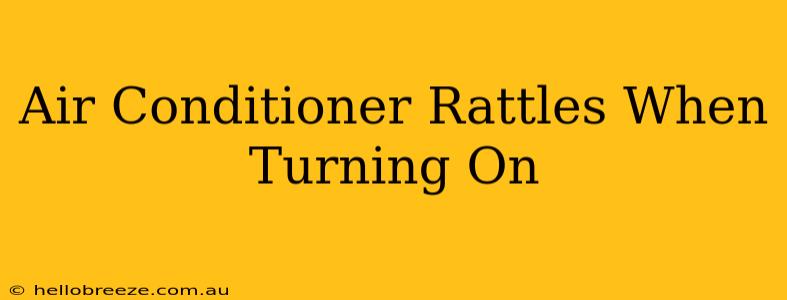Is your air conditioner making a rattling noise when it turns on? This is a common problem, but it shouldn't be ignored. A rattling AC can indicate a serious issue that could lead to costly repairs down the line, or even complete system failure. This guide will walk you through troubleshooting common causes and offer solutions to get your AC running quietly again.
Identifying the Source of the Rattle
Before you start troubleshooting, try to pinpoint where the rattle is coming from. Is it coming from the indoor unit (the air handler), the outdoor unit (the condenser), or somewhere in the ductwork? Knowing the location will significantly narrow down the possible causes.
Indoor Unit (Air Handler) Rattle:
- Loose Components: The most common culprit is loose components inside the air handler. This could include loose screws, blower motor mounts, or even debris caught in the fan blades. Safety First: Always turn off the power to the unit at the breaker before inspecting the inside.
- Ductwork Problems: A rattling sound might originate from loose or poorly connected ductwork near the air handler. Vibrations from the blower motor can transfer through the ductwork, creating a rattling noise.
- Frozen Evaporator Coil: While less likely to cause a rattling sound initially, a frozen evaporator coil can lead to ice buildup which, upon thawing, can cause parts to shift and rattle.
Outdoor Unit (Condenser) Rattle:
- Loose Fan Blades: The fan blades on the condenser unit are prone to becoming loose over time. A wobbly fan blade will create a rattling or scraping sound as it spins.
- Debris Buildup: Leaves, twigs, or other debris can get caught in the condenser fan, causing rattling.
- Loose Fins: The condenser fins are delicate and can bend or become loose. This can lead to rattling as they vibrate against other parts.
- Compressor Issues: Though less common, a malfunctioning compressor can sometimes produce rattling noises. This usually requires professional attention.
Ductwork Rattle:
- Loose Connections: As mentioned, loose connections in the ductwork can amplify the sounds from the air handler.
- Poorly Supported Ducts: Ductwork that isn't properly supported can vibrate and rattle when the air conditioner is running.
Troubleshooting and Solutions
Once you've identified the likely source, here are some steps you can take:
For loose components inside the air handler:
- Tighten screws: Carefully inspect all screws and tighten any that are loose.
- Check blower motor mounts: Make sure the blower motor is securely mounted.
- Remove debris: Remove any debris from the fan blades.
For ductwork problems:
- Secure loose connections: Use duct tape or metal connectors to secure any loose connections.
- Support poorly supported ducts: Add supports to any sections of ductwork that are sagging or vibrating.
For outdoor unit problems:
- Check fan blades: Tighten loose fan blades or replace them if necessary.
- Remove debris: Carefully remove any debris from the condenser fan.
- Straighten bent fins: Gently straighten any bent condenser fins using a fin comb (available at most hardware stores). Caution: Don't bend them too aggressively, as you may damage them further.
When to Call a Professional:
If you're unable to identify or fix the problem, or if the rattle is accompanied by other unusual noises or performance issues (reduced cooling, strange smells), it's crucial to call a qualified HVAC technician. Attempting to repair complex problems yourself can potentially damage your system further and void warranties. A professional can diagnose the issue accurately and safely implement the necessary repairs.
Preventative Maintenance: Keeping Your AC Quiet
Regular maintenance is key to preventing future rattling issues. This includes:
- Cleaning the air filter regularly: A dirty filter restricts airflow, causing the system to work harder and potentially leading to component stress and rattling.
- Scheduling annual professional maintenance: A professional HVAC technician will inspect your system for potential problems, including loose parts and other issues that could cause rattling or other problems.
By following these steps, you can troubleshoot and often resolve a rattling air conditioner effectively. Remember that safety should always be your top priority. If you are unsure about any aspect of this process, it's always best to consult with a professional.

